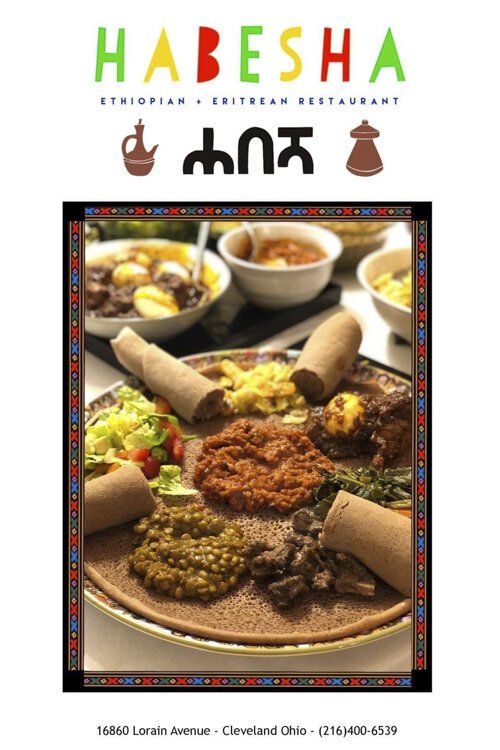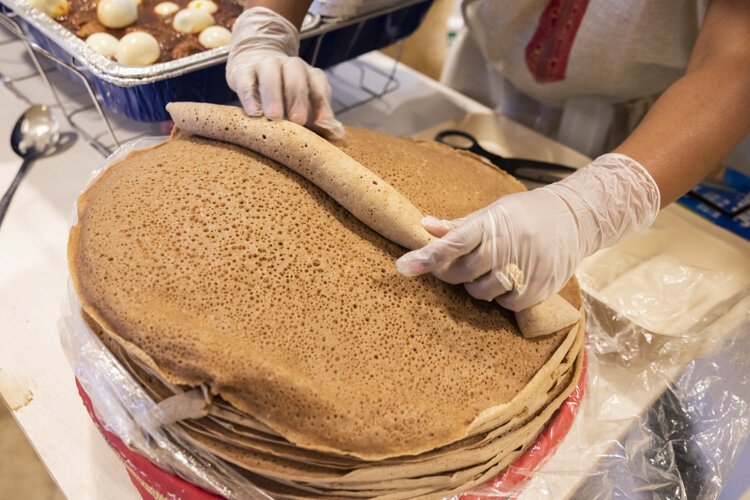Taste of home: Despite the pandemic, trio pursues dream of opening Ethiopian and Eritrean restaurant
The first guests arrived on Friday, Dec. 4 at Habesha Ethiopian and Eritrean Restaurant before the ribbon had even been cut.
“We’ll be with you in a moment,” said co-owner Jamal Musa, passing out menus while his business partners—Hiriyti Weldeslasie and Tigist Gebremichael—changed into traditional Ethiopian and Eritrean dresses. The three made short speeches, cut the ribbon, donned their aprons, then rushed back inside to continue cooking.
On its first evening open, the three-person staff cooked and served more than 50 meals.
“It’s been a very long process,” says Musa. “But our first day went way better than expected, especially in the midst of the pandemic.”
 The restaurant at 16860 Lorain Ave. in Kamm’s Corners has been over a year in the making. It was born out of Musa, Geremichael, and Weldeslasie’s shared passion for bringing people together through food. The three are from Ethiopia (Gebremichael and Musa) and Eritrea (Weldeslasie) but have lived in Cleveland between six and 20 years.
The restaurant at 16860 Lorain Ave. in Kamm’s Corners has been over a year in the making. It was born out of Musa, Geremichael, and Weldeslasie’s shared passion for bringing people together through food. The three are from Ethiopia (Gebremichael and Musa) and Eritrea (Weldeslasie) but have lived in Cleveland between six and 20 years.
“Habesha is a word used to refer to both Ethiopian and Eritrean people,” reads a mural on the restaurant’s wall. “It is a symbol of peace and unity within our community. We welcome you to join in this community through the enjoyment of our food.”
The three began testing an idea for the restaurant in 2019 through US Together’s Microenterprise Development program. The program provides start-up support to entrepreneurs who have recently arrived in Cleveland from other countries.
At the time, Musa worked as a taxi driver, while his wife Gebremichael worked at the Cleveland Clinic, and Weldeslasie worked in a factory. But all three shared a passion and background in cooking. They would often help cook meals for newcomers from the East African community.
“When I first met them, they were all already leaders in their community,” says Michelle Taylor, the former Microenterprise Development program coordinator at US Together. “They’d help cook for families, and help newcomers get settled. They knew that there was a desire for Ethiopian and Eritrean food amongst their own community but wanted to see if it was possible to turn it into a business.”
The three began testing their idea through the North Union Farmers Market at Shaker Square.
“They sold out of food in the first hour,” says Taylor. “That’s when they knew they had something.”
The team continued testing their idea throughout 2019 in farmers markets in Shaker Heights, Westlake, Lakewood, and the Cleveland Flea. Each time, the group would sell out shortly after arriving.
The three began leasing their current 2,000-square-foot restaurant space this past March—just a few days before the pandemic shutdown restaurants.
“It was definitely scary, not knowing what was going to happen,” says Musa. “But we decided to go ahead and try.”
Musa says opening week was even busier than expected. The restaurant is one of three Ethiopian restaurants in Cleveland, but the only one on the west side of Cleveland.
 Ambesha, a traditional bread at Habesha Ethiopian and Eritrean Restaurant.Habesha’s menu features appetizers like beef or lentil filled sambusas and green salads; while main dishes include beef and chicken options—served as a stew served atop a spongy injera bread. Vegetarian options include mains made from collard greens, cabbage, beans, carrots, and onion, as well as a variety of lentil dishes.
Ambesha, a traditional bread at Habesha Ethiopian and Eritrean Restaurant.Habesha’s menu features appetizers like beef or lentil filled sambusas and green salads; while main dishes include beef and chicken options—served as a stew served atop a spongy injera bread. Vegetarian options include mains made from collard greens, cabbage, beans, carrots, and onion, as well as a variety of lentil dishes.
Spice levels range from mild to very hot, depending on customer preference.
Musa says the hardest part so far has been trying to source the necessary spices and ingredients amid the pandemic.
“A lot of the spices aren’t available here, because there’s no spice supplier for the main spice we use—berbere,’ he says. “We sometimes have to drive to D.C. to get spices. One of the ingredients we use to make the injera bread—teff (an Ethiopian grain)—can only be bought in Columbus. So, I’ve had to make two trips this week already.”
The restaurant is open for dine-in or takeout from Tuesday to Sunday, 11:30 a.m. to 9:00 p.m., and is located at 16860 Lorain Ave. Musa says they plan to do delivery in the future.
“We just need to make sure we don’t get overwhelmed,” says Musa.
